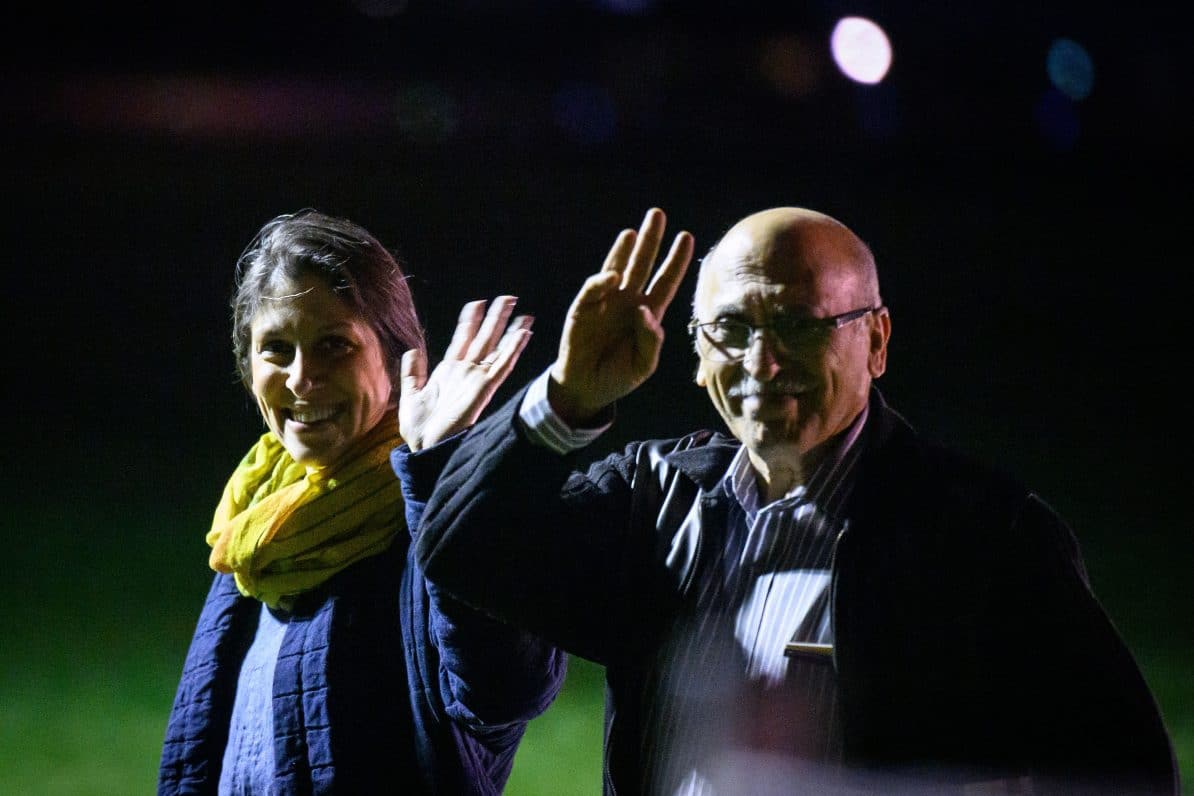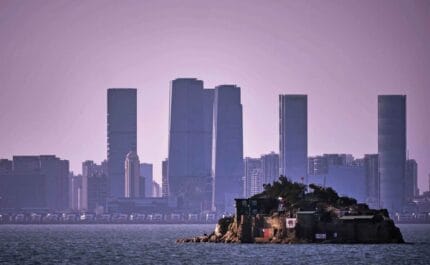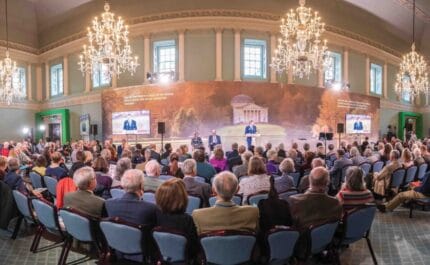DG #45 preview: The final days of captivity
A preview of our longform story on Iran's hostage diplomacy, from the forthcoming issue of Delayed Gratification

Nazanin Zaghari-Ratcliffe and Anoosheh Ashoori wave after landing at RAF Brize Norton on 17th March 2022. Photo: LEON NEAL/POOL/AFP via Getty Images
The new issue of Delayed Gratification, which will be out next week, features a longform article about the British dual-nationals held hostage by Iran. Our associate editor Matthew Lee began work on the piece by visiting Richard Ratcliffe during his hunger strike outside the Foreign Office in London in October, and followed the story through to the release of Nazanin Zaghari-Ratcliffe and Anoosheh Ashoori in March. Here, our editorial director Marcus Webb asks him about his experience of reporting on the final few months of two families’ awful ordeal.
Marcus Webb: Why did you want to write about the dual nationals detained by Iran?
Matthew Lee: In October I listened to 544 Days, an excellent podcast by Jason Rezaian, the Washington Post journalist who was held hostage by Iran. It focuses on the behind-the-scenes efforts made by his family, supporters and officials to free him from Evin prison, and it was fascinating hearing about how his brother and mother, just ordinary citizens until Jason was taken, sprung into action and became these formidable campaigners. I was listening to the podcast when I saw that Richard Ratcliffe had started a hunger strike outside the Foreign Office in London and I wondered if there was a story to tell about the behind-the-scenes efforts to free her.
MW: The article ended up being more about Anoosheh Ashoori, the other dual national Briton who was released last month, than Nazanin Zaghari-Ratcliffe…
ML: We always try to find new perspectives and untold stories in Delayed Gratification, and it was a challenge to find these with Nazanin, whose campaign had received plenty of press coverage over the years, in large part because her husband is such a formidable campaigner. It was a different story, however, with Anoosheh Ashoori, another British-Iranian dual national held by Iran on bogus charges. He’s a man from south London who’d been in prison for four and a half years and most British people, including many who knew about Nazanin’s case, had never heard of him. This wasn’t because his family weren’t formidable campaigners themselves, but they faced all these uphill battles – against Iran’s complex, opaque and cruel political and legal systems; against a British news media that largely seemed disinterested in any British hostage story beyond Nazanin; and a British government that didn’t seem to consider their husband and father British enough to fight for.
MW: How did Barry Rosen and Nizar Zakka become part of the piece?
ML: There are four extraordinary ex-detainees of Evin prison in this article. When I spoke to Sherry, Anoosheh’s wife, in January, she was sure that Anoosheh will keep fighting for the people still in prison the moment he’s released, which we can already see him doing. The day after I met Sherry, Barry Rosen, an American who was held at the US embassy in Tehran in the original hostage crisis, announced that he was going on hunger strike at the nuclear talks in Vienna in an effort to get the hostages in Iran released. Barry arrived in Vienna on the 41st anniversary of his release from Iran and he told me that while he’s in a good place right now he’s had terrible struggles with PTSD over the decades and that he thinks about Iran all the time. Nizar Zakka, meanwhile, works with other ex-hostages to fight against state hostage-taking around the world, and he told me that his work is his therapy. He was also in Vienna campaigning at the nuclear talks, and Anoosheh joined their hunger strike in solidarity from prison in Iran. Barry and Nizar offer a reminder that the story doesn’t end with the hostages’ release, that healing is a long slow process. My best guess is that both Nazanin and Anoosheh will, like Barry and Nizar, feel a need to fight for the hostages they left behind, and to prevent others being taken in the future.
MW: Did the release of Nazanin and Anoosheh in March come as a surprise?
ML: It looked like they were on the verge of being released at the start of March but then Russia invaded Ukraine and all bets were off. When the nuclear talks in Vienna were paused on 11th March due to issues with Russian sanctions it looked like a bad sign but a few days later they were released, perhaps in part due to a new western need for Iranian oil. It was so beautiful seeing Nazanin and Anoosheh stepping off that plane, a rare good news story in difficult times. The first thing Anoosheh’s family told me about him was that he absolutely loved science, and he walked off the plane holding a New Scientist supplement on the origins of life on Earth. Just seeing him doing the simplest of things, having the freedom to read a science magazine, was touching.
MW: How did their release affect your story?
ML: I’d finished the piece two days before they were released, so I had to do a last-minute rewrite. Not that I minded – it was such a pleasure to give the story a happy ending. Well, it’s a far happier ending than I anticipated, but the happiness is tempered by the fact that Morad Tahbaz and Mehran Raoof, both British citizens, are still in prison in Iran, as are many other innocent people, and maybe other Britons we don’t know about. Morad and Mehran should have been on that plane too.
MW: Do you have any hope that the other hostages will be released?
ML: All of the foreign hostages in Iranian prisons are pawns in a much bigger geopolitical game – and so the nuclear talks in Vienna might well be key to their release. When I spoke to Richard Ratcliffe in February his biggest fear seemed to be that the nuclear talks collapsed and Iran lashed out by handing out new prison sentences on new bogus charges. But hopefully if a nuclear deal is made there will be a large-scale prisoner release. There’s also the bigger question of how you stop Iran and other countries using the tactic of ‘hostage diplomacy’, as the practice is called, in the future. Pretty much everyone I spoke to, including Rachel Briggs, who’s one of the foremost experts on hostage-taking, agreed that multilateral action is needed and possibly sanctions targeting individual officials in Iran, like Magnitsky sanctions have been used against Russia officials. Unfortunately hostage-taking seems to have worked pretty well for Iran – both the US and the UK have paid off historical debts in exchange for their hostages – and we’re seeing other countries like China and Turkey doing the same thing, while there are questions over whether Russia is using basketball star Brittney Griner as a hostage. State hostage-taking is enormously destructive but not enough is happening to punish the perpetrators. That needs to change.
Links and resources
#FreeMorad
The Twitter account for the campaign to free Morad Tahbaz, a British citizen unjustly detained prison in Iran
twitter.com/FreeMorad1
Hostage Aid Worldwide
The NGO set up by former hostage Nizar Zakka, which brings former hostages and their families together to fight for the release of the unjustly detained around the world
hostageaid.org
Hostage International
A charity that supports hostages after their release with emotional and practical support. You can donate to them through their website.
hostageinternational.org
Rachelbriggs.org
The personal website of Rachel Briggs, an expert on hostage-taking, the founding director of Hostage International, and the co-founder and CEO of consultancy the Clarity Factory
Redress
Human rights NGO that worked closely with the Free Nazanin campaign
Slow Journalism in your inbox, plus infographics, offers and more: sign up for the free DG newsletter. Sign me up
Thanks for signing up.








